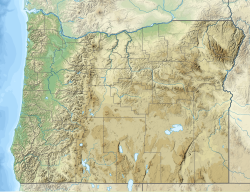The Chalk Butte Formation is a geologic formation in Oregon, which forms a part of the Idaho Group.[1] It preserves fossils dating back to the Neogene period.[2] It was proposed along with the Grassy Mountain Basalt Formation and the Kern Basin Formation as a division of the Idaho Group rocks in the Mitchell Butte Quadrangle.[3] The predominant rock types are tuffaceous sandstones, siltstones, and conglomerates with smaller amounts of tuff, ash beds, and freshwater limestone.[3] A partial section at the type location determined the formation to be about 538 feet thick.[3]
| Chalk Butte Formation | |
|---|---|
| Stratigraphic range: Tortonian-Zanclean (Hemphillian) ~ | |
| Type | Formation |
| Thickness | About 538 feet |
| Lithology | |
| Primary | Tuffaceous sandstones, siltstones, conglomerates |
| Other | Tuff, ash beds, freshwater limestone |
| Location | |
| Coordinates | 43°36′N 117°30′W / 43.6°N 117.5°W |
| Approximate paleocoordinates | 44°18′N 114°36′W / 44.3°N 114.6°W |
| Region | Malheur County, Oregon |
| Country | |
| Type section | |
| Named for | Chalk Butte |
Fossil content
editThe following fossils have been reported from the formation:[2][4]
- Antecalomys valensis
- Basirepomys pliocenicus
- Copemys cf. esmeraldensis
- Cupidinimus magnus
- Diprionomys parvus
- Dipoides vallicula
- Eucyon davisi
- Goniodontomys disjunctus
- Hypolagus vetus
- Peromyscus antiquus
- Pliohippus spectans
- Plionictis oregonensis
- Scapanus proceridens
- Dipoides sp.
- Spermophilus sp.
- Camelidae indet.
- Perognathinae indet.
- Soricidae indet.
- ?Vespertilionidae indet.
See also
editReferences
edit- ^ Chalk Butte Formation at USGS
- ^ a b Chalk Butte Formation at Fossilworks.org
- ^ a b c Corcoran, R. E.; Doak, R. A.; Porter, P. W.; Pritchett, F. I.; Privrasky, N. C. (1962). "Geology of the Mitchell Butte Quadrangle, Oregon" (PDF). Geological Map Series. Portland, Oregon: State of Oregon Department of Geology and Mineral Industries. Retrieved 26 June 2024.
- ^ Shotwell, 1970
Bibliography
edit- Shotwell, J. A (1970), "Pliocene mammals of southeast Oregon and adjacent Idaho", Bulletin of the Museum of Natural History, University of Oregon, 17: 1–103

